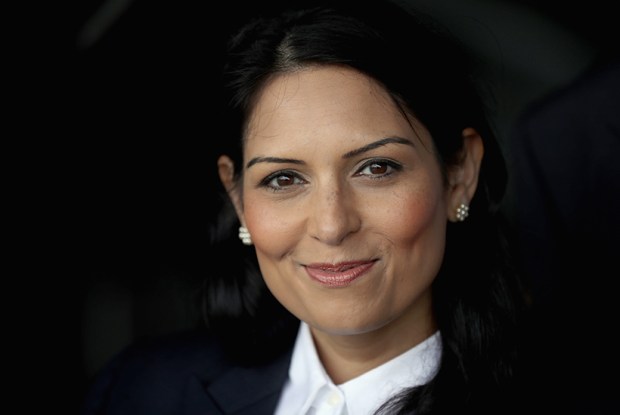A man in Austria has been sentenced to three months in prison for posting a picture of his cat on the internet. The photograph showed the cat, which has not been named, raising its right paw in the air in what appears to be a Nazi salute. It also had a side parting in the fur on its head and what we might describe as a distinctive moustache. Clearly the benighted creature was a fan of the controversial politician Adolf Hitler, and equally clearly the Austrians feel a little bit sensitive about all that business. Outrageously, there was no punishment whatsoever for the cat itself, which surely knew what it was getting itself into and cheerfully connived in the whole sordid episode. I’d have had it shot, bang, just like that. There is no place in decent society for animals which venerate Hitler — or Goebbels, Hess or any of those others.
About 80 years ago, on Hitler’s orders, the SS became interested in politicising pets, and especially dogs. Hitler was fascinated by dogs and believed there were hidden depths to their talents. On his orders a hundesprechschule was founded to develop their intellect and teach them German, in the hope they might one day be used for military purposes. You are probably musing to yourself that the German language does not sound terribly dissimilar to the noises you might expect to hear from an inflamed Doberman pinscher, perhaps one that had caught its genitals in a gin trap (while Heinrich Heine said much the same thing about English, so each to their own). But conjugating those verbs and getting the tenses right would surely test even the brightest collie. Anyway, the best the SS could come up with was a dachshund who, when asked ‘Wer ist Adolf Hitler?’ would reply promptly and in perfect German: ‘Mein Führer!’ And also raise his paw in salute. But I digress.
Cats — and goldfish, and houses — that look like Hitler have become a bit of an internet meme, a consequence one supposes of our endless interest in the chap and the fact that he had a very distinctive appearance. Given that one can now be arrested for wearing a Nazi costume to a fancy-dress party, under some fatuous piece of anti-hate legislation, it is surely only a matter of time before somebody over here is prosecuted for having felt-tipped a moustache on their tabby and shoved it on Instagram.
Especially if they live in the hell which is London. The new mayor of London, Sadiq Khan, has just announced the formation of a new ‘crime hub’, a special police unit staffed by the Metropolitan Police, which will target something called ‘trolls’. The Times reports that the two-year Online Hate Crime Hub will cost £1.7 million, including a half–million quid bung from the supine Home Office. Khan’s office announced, rather loftily, that there was ‘no place for hate’ in London. Oh yes there is, when I’m there. My face is stretched taut in a permanent rictus of loathing upon entering the capital and remains in place until either Potters Bar or Sevenoaks have been cleared.
There is something magnificently fatuous in trying to outlaw an emotion, and especially one as productive, on occasion, as hatred. If they are determined to go down this route I would much rather they outlawed simpering or self-righteousness — but that would mean banging up half the capital, including the mayor himself.
And then there is the issue of the aforementioned trolls. Khan’s henchmen are not referring to hirsute ogres from Norse legend, sadly — that would have been a slightly more entertaining use of police time — but to people who, properly speaking, do not exist at all. ‘Troll’ is simply a word appended to someone who has said something with which you vigorously disagree. I get called a troll on a pretty much daily basis — usually for saying stuff like ‘I do wish, in that brief moment between those synchronised divers taking off from the board and landing below, someone would drain the water from the pool.’ Take part in any internet discussion for more than five minutes and you’re almost certain to be called a troll, especially if the discussion is about politics or why Brighton is a moral cesspit which should be cleansed from the earth (as detailed in the Sibylline Oracles). Speak on any subject, no matter how judicious your mode of expression, how sincere your motivation, and someone will accuse you of being possessed of, or of displaying, hatred.
It is no longer possible simply to argue that you have your opinion and they have theirs: the internet has taken us all to a place way beyond the reach of such common sense. It is perhaps the anonymity of social media and its instantaneousness that effects this kind of polarisation — as well as the fact that there are hundreds of thousands of people out there desperate to take offence, yearning to be victims of a hate crime, anxious to see you and me punished.
I suppose the police go along with this sort of garbage partly because they have to, but also because these non-crimes are very fashionable and politically correct and are rather less messy to clear up than other sorts of crimes. The rozzers get themselves establishment brownie points without having to do anything too onerous or too dangerous. But trolling is a crime in which nobody is really hurt or even seriously discommoded — unlike, say, being stabbed in the throat, having your car nicked or being burgled. Suffer either of the latter two crimes and you will be exceedingly lucky if a copper turns up at all. Whereas tweet that ‘we should kick out the immigrants, pronto’ and it won’t just be the filth who swarm round, but social services too, if you have children. It is a strange position we have got ourselves into.
The post It’s fatuous to outlaw an emotion – especially hate appeared first on The Spectator.
Got something to add? Join the discussion and comment below.
Get 10 issues for just $10
Subscribe to The Spectator Australia today for the next 10 magazine issues, plus full online access, for just $10.
You might disagree with half of it, but you’ll enjoy reading all of it. Try your first month for free, then just $2 a week for the remainder of your first year.















Comments
Don't miss out
Join the conversation with other Spectator Australia readers. Subscribe to leave a comment.
SUBSCRIBEAlready a subscriber? Log in